Related Research Articles

Super Bowl X was an American football game between the National Football Conference (NFC) champion Dallas Cowboys and the American Football Conference (AFC) champion Pittsburgh Steelers to decide the National Football League (NFL) champion for the 1975 season. The Steelers defeated the Cowboys by the score of 21–17 to win their second consecutive Super Bowl. They were the third team to win back-to-back Super Bowls. It was also the first Super Bowl in which both participating teams had previously won a Super Bowl, as the Steelers were the defending champions and the Cowboys had won Super Bowl VI.
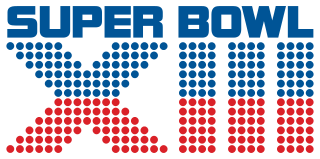
Super Bowl XIII was an American football game between the American Football Conference (AFC) champion Pittsburgh Steelers and the National Football Conference (NFC) champion Dallas Cowboys to decide the National Football League (NFL) champion for the 1978 season. The Steelers defeated the Cowboys by the score of 35–31. The game was played on January 21, 1979, at the Miami Orange Bowl in Miami, Florida, the fifth and last time that the Super Bowl was played in that stadium.
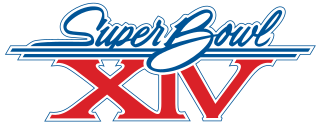
Super Bowl XIV was an American football game between the National Football Conference (NFC) champion Los Angeles Rams and the American Football Conference (AFC) champion Pittsburgh Steelers to decide the National Football League (NFL) champion for the 1979 season. The Steelers defeated the Rams by the score of 31–19, becoming the first team to win four Super Bowls. The game was played on January 20, 1980, at the Rose Bowl in Pasadena, California, and was attended by a Super Bowl record 103,985 spectators. It was also the first Super Bowl where the game was played in the home market of one of the participants, as Pasadena is 10 miles (16 km) northeast of Downtown Los Angeles.
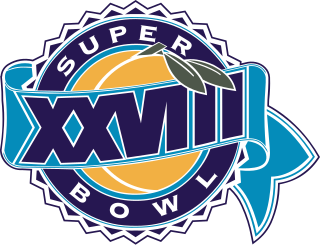
Super Bowl XXVIII was an American football game between the National Football Conference (NFC) champion Dallas Cowboys and the American Football Conference (AFC) champion Buffalo Bills to decide the National Football League (NFL) champion for the 1993 season. The Cowboys defeated the Bills, for the second straight year, by a score of 30–13, winning their fourth Super Bowl in team history, tying the Pittsburgh Steelers and the San Francisco 49ers for most Super Bowl wins. The Buffalo Bills became the only team to both play and lose four consecutive Super Bowls for a 0-4 franchise Super Bowl record, and as of 2023, remains the team's most recent Super Bowl appearance. The game was played on January 30, 1994, at the Georgia Dome in Atlanta. Since the 1993 regular season was conducted over 18 weeks, the traditional bye week between the conference championship games and the Super Bowl was not employed; the last time this had happened was before Super Bowl XXV.
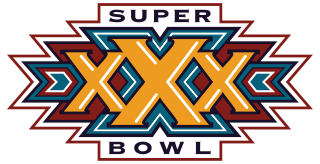
Super Bowl XXX was an American football game between the National Football Conference (NFC) champion Dallas Cowboys and the American Football Conference (AFC) champion Pittsburgh Steelers to decide the National Football League (NFL) champion for the 1995 season. The Cowboys defeated the Steelers by the score of 27–17, winning their fifth Super Bowl in team history. The game was played on January 28, 1996, at Sun Devil Stadium in Tempe, Arizona, the first time the Super Bowl was played in the Phoenix metropolitan area.
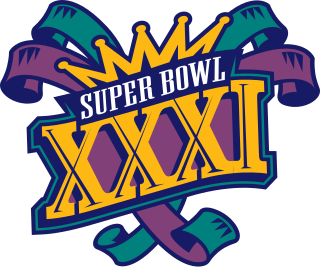
Super Bowl XXXI was an American football game between the American Football Conference (AFC) champion New England Patriots and the National Football Conference (NFC) champion Green Bay Packers to decide the National Football League (NFL) champion for the 1996 season. The Packers defeated the Patriots by the score of 35–21, earning their third overall Super Bowl victory, and their first since Super Bowl II. The Packers also extended their league record for the most overall NFL championships to 12. It was also the last in a run of 13 straight Super Bowl victories by the NFC over the AFC. The game was played on January 26, 1997, at the Louisiana Superdome in New Orleans, Louisiana.

The National Football League playoffs for the 1983 season began on December 24, 1983. The postseason tournament concluded with the Los Angeles Raiders defeating the Washington Redskins in Super Bowl XVIII, 38–9, on January 22, 1984, at Tampa Stadium in Tampa, Florida.

Vince Anthony Ferragamo is an American former professional football player who was a quarterback in the National Football League (NFL) and the Canadian Football League (CFL). He played college football for the California Golden Bears and Nebraska Cornhuskers.
The National Football League playoffs for the 1978 season began on December 24, 1978. The postseason tournament concluded with the Pittsburgh Steelers defeating the Dallas Cowboys in Super Bowl XIII, 35–31, on January 21, 1979, at the Orange Bowl in Miami.
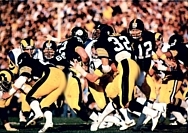
The National Football League playoffs for the 1979 season began on December 23, 1979. The postseason tournament concluded with the Pittsburgh Steelers defeating the Los Angeles Rams in Super Bowl XIV, 31–19, on January 20, 1980, at the Rose Bowl in Pasadena, California.
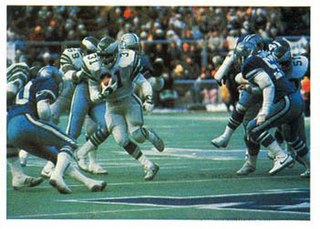
The National Football League playoffs for the 1980 season began on December 28, 1980. The postseason tournament concluded with the Oakland Raiders defeating the Philadelphia Eagles in Super Bowl XV, 27–10, on January 25, 1981, at the Louisiana Superdome in New Orleans, Louisiana.
The halfback option play is an unorthodox play in American and Canadian football. It resembles a normal running play, but the running back has the option to throw a pass to another eligible receiver before crossing the line of scrimmage.
Alvin Craig Harper is an American former professional football player who was a wide receiver in the National Football League (NFL) for the Dallas Cowboys, Tampa Bay Buccaneers, Washington Redskins and New Orleans Saints. He played college football for the Tennessee Volunteers. Harper was selected by the Dallas Cowboys in the first round of the 1991 NFL Draft. He played in Dallas for four years as the Cowboys won Super Bowl XXVII and Super Bowl XXVIII, both against the Buffalo Bills.
The 1967 Green Bay Packers season was their 49th season overall and their 47th season in the National Football League (NFL) and resulted in a 9–4–1 record and a victory in Super Bowl II. The team beat the Dallas Cowboys in the NFL Championship Game, a game commonly known as the "Ice Bowl," which marked the second time the Packers had won an NFL-record third consecutive NFL championship, having also done so in 1931 under team founder Curly Lambeau. In the playoff era, it remains the only time a team has won three consecutive NFL titles.
This article contains an in-depth explanation of the history of the Dallas Cowboys, a professional American football team that competes in the National Football League (NFL).
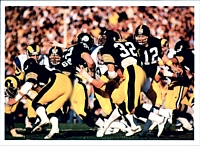
The 1979 season was the Los Angeles Rams' 42nd season in the National Football League (NFL), their 43rd overall, and their 34th in the Greater Los Angeles Area. It was the final season for the franchise in the Los Angeles Memorial Coliseum until 2016, as late owner Carroll Rosenbloom previously announced the Rams would move to Anaheim Stadium for the 1980 season.
The 1978 Los Angeles Rams season was the team's 41st year with the National Football League and the 33rd season in Los Angeles. They improved on their 10–4 record from the previous season and finished 12–4.

The 2004 season was the Dallas Cowboys' 45th in the National Football League (NFL), their 16th under the ownership of Jerry Jones, their 33rd playing their home games at Texas Stadium, and their second season under head coach Bill Parcells. The team failed to improve on their 10-6 record in 2003 and finished at 6–10, failing to make the playoffs for the fourth time since 1999.

The 1970 Dallas Cowboys season was the team's 11th in the National Football League (NFL).
The 1979 Dallas Cowboys season was their 20th in the league. The team was unable to improve on their previous output of 12–4, winning eleven games. They qualified for the playoffs, but lost in the divisional round.
References
- ↑ "Preston Dennard College Stats".
- ↑ "Dallas Cowboys at Los Angeles Rams - December 15th, 1980". Pro-Football-Reference.com .
- ↑ "Wild Card - Los Angeles Rams at Dallas Cowboys - December 28th, 1980". Pro-Football-Reference.com .
- ↑ "SPORTS PEOPLE; Bills Get Dennard". The New York Times. 3 August 1984.
- ↑ "SPORTS PEOPLE; Bills Get Dennard". The New York Times. 3 August 1984.
- ↑ "Miami Dolphins at Green Bay Packers - December 8th, 1985". Pro-Football-Reference.com .
- ↑ "Going back in time: Preston Dennard recalls Super Bowl XIV - Albuquerque Journal".
- ↑ "The University of New Mexico Lobos - Preston Dennard". www.golobos.com. Archived from the original on 2016-09-11.